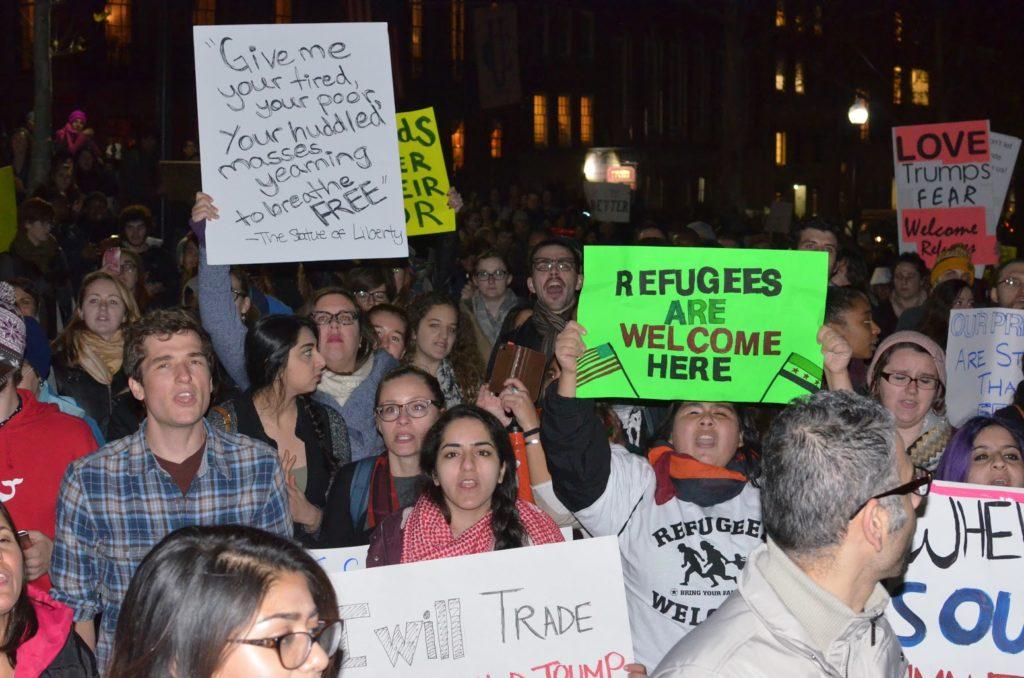By Audrey Cooney, news staff
In a letter sent to Gov. Charlie Baker and the rest of the country’s governors on Monday, the White House offered individualized data and monthly reports on the number and demographics of refugees resettled in each state.
The step marked the latest development in a fraught debate over Syrian refugees that began two weeks ago when Baker declared his opposition to allowing them to settle in Massachusetts. More than two dozen other governors expressed similar statements following the Nov. 13 terrorist attacks in Paris.
“I’m not interested in accepting refugees from Syria,” Baker said on Nov. 16.
Baker’s stance sparked swift criticism from advocates, legal experts and citizens who supported the rights of displaced persons.
On Nov. 20, several hundred people gathered to rally in front the State House in protest of Baker’s statement. The crowd chanted phrases such as “Don’t give in to racist fear, refugees are welcome here,” and condemned the resistance to allowing Syrian refugees into the state as racist and Islamophobic.
“There have been no Syrians who have been criminals coming in,” Greg Williams, a rallier and member of Quakers Concerned with Immigration Justice, said. “There hasn’t been anyone causing trouble… You can’t lump [the Islamic State] and Muslims all together.”
While governors lack the legal authority to prevent refugees from being resettled in their states, they can make the process much more difficult, according to Shannon Erwin, executive director of the Muslim Justice League (MJL). MJL is a Boston-based organization that advocates primarily for people affected or displaced by the War on Terror.
“[Governors] certainly have authority over their own state agencies,” Erwin said. “Agencies can be more or less cooperative and make it easier or harder for refugees coming in through the federal programs.”
On the day of the rally, 27 Republican governors signed a letter to President Barack Obama asking him to “suspend all plans to resettle additional Syrian refugees.” Baker declined to add his name.
The day before, the US House of Representatives passed a bill calling for increased security checks for displaced persons coming from Syria and Iraq.
Reps. William Keating, D-Mass., and Stephen Lynch, D-Mass., both cast votes supporting the GOP-authored bill. In a statement, Keating justified his vote by saying the measure would promote intelligence sharing between federal agencies and increase security.
“My effort in supporting this was to make sure our agencies are accountable and they’re doing their job,” Keating said.
Those opposed to the measure argued it would allow for discrimination.
“It’s fear-mongering,” Sarang Sekhavat, federal policy director for The Massachusetts Immigrant and Refugee Advocacy Coalition, said. “The majority of people we take are families, are women and children. If we have even the slightest suspicion that someone might be involved in terrorism, we don’t need to take them.”
The US will admit 85,000 refugees during the 2016 fiscal year, roughly 10,000 of whom will be from Syria, according to State Department data.
People admitted will have undergone a rigorous process of interviews and background checks conducted by multiple investigators, including the Department of Homeland Security, according to Sekhayat.
“[Their] fingerprints are checked against pretty much every US government database you can think of,” Sekhavat said.
Given the security measures in place, continued opposition to resettling displaced persons represents a failure of compassion, advocates said.
“We are strongly in favor of continuing to allow all refugees who qualify into the country, including Syrian refugees,” Erwin said. “We have international moral obligations toward folks who are fleeing for their lives.”
Photo by Robert Smith









